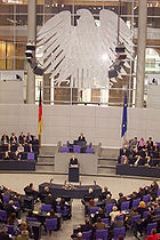
Bundestag
Overview
Germany
Germany , officially the Federal Republic of Germany , is a federal parliamentary republic in Europe. The country consists of 16 states while the capital and largest city is Berlin. Germany covers an area of 357,021 km2 and has a largely temperate seasonal climate...
. In practice Germany is governed by a bicameral
Bicameralism
In the government, bicameralism is the practice of having two legislative or parliamentary chambers. Thus, a bicameral parliament or bicameral legislature is a legislature which consists of two chambers or houses....
legislature
Legislature
A legislature is a kind of deliberative assembly with the power to pass, amend, and repeal laws. The law created by a legislature is called legislation or statutory law. In addition to enacting laws, legislatures usually have exclusive authority to raise or lower taxes and adopt the budget and...
, of which the Bundestag serves as the lower house
Lower house
A lower house is one of two chambers of a bicameral legislature, the other chamber being the upper house.Despite its official position "below" the upper house, in many legislatures worldwide the lower house has come to wield more power...
and the Bundesrat
Bundesrat of Germany
The German Bundesrat is a legislative body that represents the sixteen Länder of Germany at the federal level...
the upper house
Upper house
An upper house, often called a senate, is one of two chambers of a bicameral legislature, the other chamber being the lower house; a legislature composed of only one house is described as unicameral.- Possible specific characteristics :...
. The Bundestag is established by the German Basic Law of 1949, as the successor to the earlier Reichstag
Reichstag (Weimar Republic)
The Reichstag was the parliament of Weimar Republic .German constitution commentators consider only the Reichstag and now the Bundestag the German parliament. Another organ deals with legislation too: in 1867-1918 the Bundesrat, in 1919–1933 the Reichsrat and from 1949 on the Bundesrat...
. Norbert Lammert
Norbert Lammert
Norbert Lammert is a German politician . He has been the President of the Bundestag, the German parliament, since 2005.-Early Life:...
is the current President of the Bundestag
President of the Bundestag
The President of the Bundestag presides over the sessions of the Bundestag, the parliament of Germany, with functions similar to that of a speaker in other countries. In the German order of precedence, his office is ranked second after the President and before the Chancellor...
.
With the dissolution of the German Confederation
German Confederation
The German Confederation was the loose association of Central European states created by the Congress of Vienna in 1815 to coordinate the economies of separate German-speaking countries. It acted as a buffer between the powerful states of Austria and Prussia...
in 1866 and the founding of the German Empire
German Empire
The German Empire refers to Germany during the "Second Reich" period from the unification of Germany and proclamation of Wilhelm I as German Emperor on 18 January 1871, to 1918, when it became a federal republic after defeat in World War I and the abdication of the Emperor, Wilhelm II.The German...
(Deutsches Reich
Deutsches Reich
Deutsches Reich was the official name for Germany from 1871 to 1945 in the German language.As the literal English translation "German Empire" denotes a monarchy, the term is used only in reference to Germany prior to the fall of the monarchies at the end of World War I in 1918...
) in 1871, the Reichstag was established as the German parliament in Berlin.
Discussions

